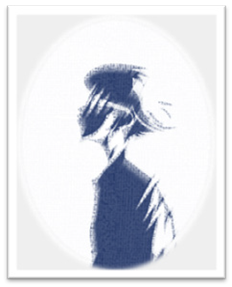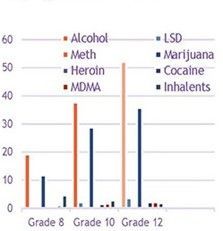GEMINI: CO-OCCURRING SUBSTANCE USE AND MENTAL HEALTH DISORDERS
PROGRAM OVERVIEW
The Gemini program serves youth ages 10 years or older who have complex needs related to substance use and mental health conditions.
GEMINI PROGRAM CRITERIA
- Youth is between the ages of 10-19
- Youth has a substance diagnosis and mental health diagnosis
- Youth are willing to be treated for both (“willing” means they have admitted to both)

Mood Disorders
- Major Depressive Disorder
- Adjustment Disorder With Depressed Mood
- Disruptive Mood Dysregulation Disorder Attention Deficit/Hyperactivity Disorder Post Traumatic Stress Disorder
- Adjustment Disorders
Behavioral Disorders
- Oppositional Defiant Disorder
- Adjustment Disorder with Disturbance of Conduct
Anxiety
- Generalized Anxiety Disorder
- Social Anxiety
- Adjustment Disorder With Anxiety
MOST COMMON MENTAL ILLNESS

ILLEGAL DRUG USE IN 2019 BY 8TH, 10TH AND 12TH GRADERS
Co–occurring disorders are not uncommon. Research by SAMHSA has shown an estimated 10 million people have
a combination of at least one mental health and one substance use disorder. As many as six of 10 adolescents with a substance use disorder also suffer from a mental health condition such as depression, PTSD, ADHD, or bipolar disorder, to name a few. When this happens, the person has “co-occurring disorders.”
MOST COMMON SUBSTANCES USED
- Alcohol
- Marijuana
- Nicotine
MOODINESS VS HORMONES
Sometimes it’s difficult to tell the difference between normal teenage moodiness, changing hormones or the use of substances.
WHAT IS A CO-OCCURING DISORDER?
- Sometimes referred to as dual diagnosis or co-morbidity .
- When a mental health and substance use disorder diagnose exists at the same
- Such as depression with alcohol abuse and anxiety or AD/HD and cannabis.
SUBSTANCE USE DISORDERS
The continual use of illegal substances often coexists with mental and emotional disorders.
The symptoms of one disorder can aggravate the symptoms of the other disorder.
At times, symptoms can overlap and even mask each other; one disorder can aggravate and even worsen the symptoms of the other.
These co–occurring disorders are sometimes difficult to diagnose and treat because they have many of the same risk factors.
The best treatment integrates addiction treatment with mental health care.
Clients with co-occurring disorders are often continually at risk of relapse. Adolescents tend to self-medicate using alcohol and other substances when mental health disorders occur first.
C&A opened its doors in late June, 1976. Learn about our wonderful history and how the agency has expanded its programs, services and locations throughout Stark County.

